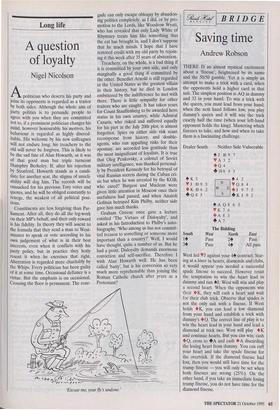Long life
A question of loyalty
Nigel Nicolson
Apolitician who deserts his party and joins its opponents is regarded as a traitor by both sides. Although the whole aim of party politics is to persuade people to agree with you when they are committed not to, if a prominent politician changes his mind, however honourable his motives, his behaviour is regarded as highly discred- itable. His welcome by his new colleagues Will not endure long; his treachery to the old will never be forgiven. This is likely to be the sad fate of Alan Howarth, as it was of that good man but triple turncoat Humphry Berkeley. If, after his rejection by Stratford, Howarth stands as a candi- date for another seat, the stigma of unreli- ability will dog him. The records will be ransacked for his previous Tory votes and quotes, and he will be obliged constantly to renege, the weakest of all political posi- tions.
Constituents are less forgiving than Par- liament. After all, they do all the leg-work on their MP's behalf, and their only reward is his fidelity. In theory they will assent to the formula that they send a man to West- minster to speak or vote according to his own judgement of what is in their best interests, even when it conflicts with his party policy, but in practice they hotly resent it when he exercises that right. Aberration is regarded more charitably by the Whips. Every politician has been guilty of it at some time. Occasional defiance is a virtue. But the emphasis is on occasional. Crossing the floor is permanent. The rene- gade can only escape obloquy by abandon- ing politics completely, as I did, or by pro- motion to the Lords, like Woodrow Wyatt, who has revealed that only Lady White of Rhymney treats him like something that the cat has brought in, and I don't suppose that he much minds. I hope that I have restored credit with my old party by rejoin- ing it this week after 35 years of abstention. Treachery, on the whole, is a bad thing if it is committed by your own side, and only marginally a good thing if committed by the other. Benedict Arnold is still regarded in the United States as the greatest villain in their history, but he died in London embittered by the indifference he met with there. There is little sympathy for other traitors who are caught. It has taken years for Count Stauffenberg to be awarded hero status in his own country, while Admiral Canaris, who risked and suffered equally for his part in the July 20th plot, is almost forgotten. Spies on either side risk scant recompense from history, and double- agents, who run appalling risks for their apostasy, are accorded less gratitude than the most insignificant of loyalists. It is true that Oleg Penkovsky, a colonel of Soviet military intelligence, was thanked personal- ly by President Kennedy for his betrayal of vital Russian secrets during the Cuban cri- sis but when he was arrested by the KGB, who cared? Burgess and Maclean were given little attention in Moscow once their usefulness had passed, and when Anatoli Golitsin betrayed Kim Philby, neither side gave him much thanks. Graham Greene once gave a lecture entitled 'The Virtues of Disloyalty', and asked in his Introduction to Philby's auto- biography, 'Who among us has not commit- ted treason to something or someone more important than a country?' Well, I would have thought, quite a number of us. But he had a point. Disloyalty demands enormous conviction and self-sacrifice. Therefore I wish Alan Howarth well. He has been called 'batty', but is his conversion so very much more reprehensible than joining the Roman Catholic church after years as a Protestant?
`Excuse me, your fly's undone.'










































































 Previous page
Previous page